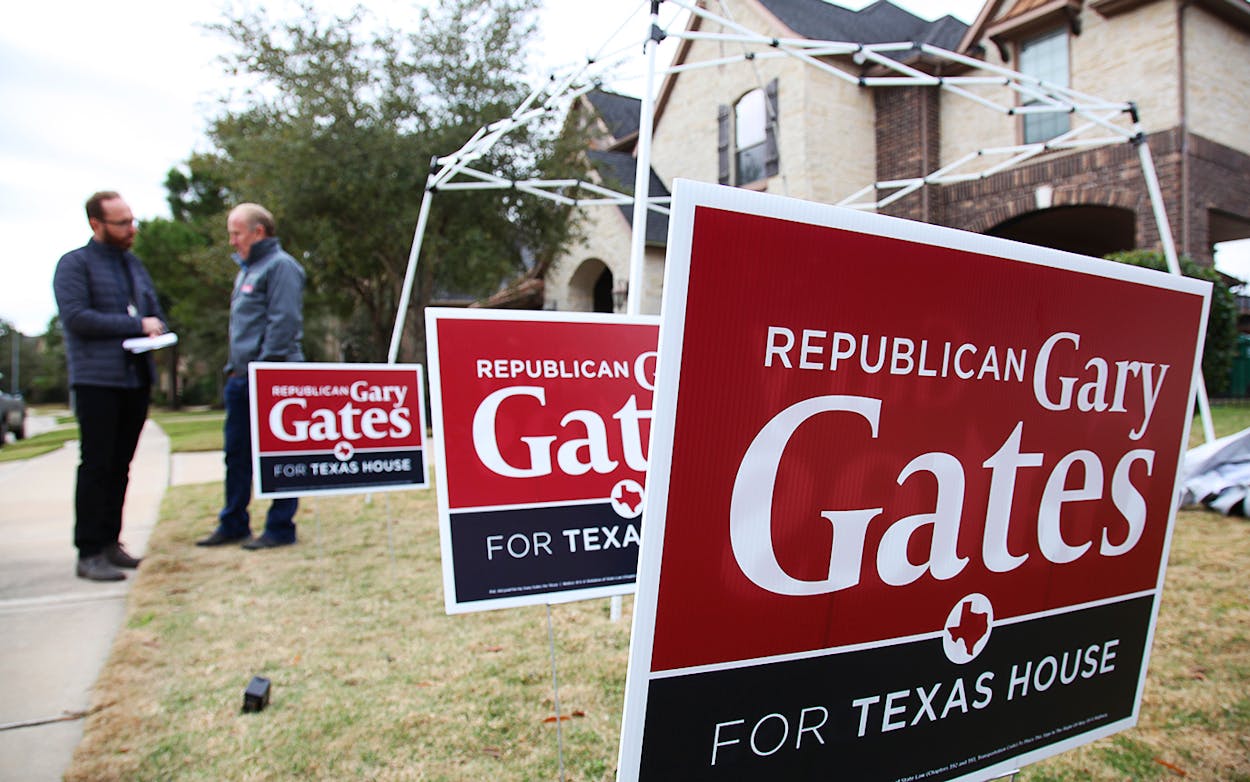Special elections play the same role in political discourse that the unexpected passing of a comet played in the ancient world—an opportunity for soothsayers of varying quality to impart their own interpretations onto an unsuspecting populace. Is it a sign that the world is ending, or that the spring festival will be especially lovely this year? Who can say?
A comet transited the sky over Fort Bend County last night: the special runoff election in state House District 28, formerly represented by respected Republican moderate John Zerwas. After national Democratic groups injected hundreds of thousands of dollars into the race and it achieved the kind of high profile normally exhibited by congressional races, Democrat Eliz Markowitz posted a truly dismal result against Republican Gary Gates, losing 42 to 58 percent—or about 12,600 votes to 17,400.
Perhaps the most interesting thing about the race, before last night, was that anyone had come to care about it at all. Zerwas won the seat by about nine percentage points in 2018, a closer scrape than he’d had in a while but not particularly frightening for the GOP. The district voted for Donald Trump by ten points in 2016, although Ted Cruz won it by only three in 2018. Still, Democrats need nine seats to take control of the state House, and if they locked down one of them in this special, it would make their path just a little bit easier.
So Beto O’Rourke came to walk blocks for Markowitz, and Joe Biden and Elizabeth Warren weighed in. The massive attention paid to this off-season state House race is a brand-new phenomenon for Texas Dems, and an important one. By the time the polls closed, even though the race had been a long shot from the get-go, Dems had something real riding on this.
There’s no shame in missing a jump shot from the half court line if you’ve got nothing to lose. But on the way down, the Markowitz campaign broke both its ankles. It would have been a treat to win, but it would have been almost as good just to improve on the party’s performance in the district in 2018. That way, there’s a reason for the money and attention to return in November, when Markowitz and Gates will likely face each other again, and the president’s unpopularity might help her along. (Texas Democrats have a spotty track record here in special elections.)
Instead they got drubbed. Republicans are taking a well-deserved victory lap: they succeeded in deflating some of the hype Texas Democrats are courting this year. Democrats are putting on a brave face, but make no mistake—they feel bad about this.
That said, this result probably doesn’t say very much about November. There’s an asymmetry of expectations to party politics in the state. No one expects anything of the Democrats, really, so when they overperform it’s ticker-tape parade time. If Markowitz had somehow won, the GOP establishment would have started pulling fire alarms. Instead they dominated, which is the god-given right of all Texas Republicans. When the Lakers win, it’s not really news. When the Phoenix Suns beat the Lakers, it is.
True Lege-heads, the grizzled veterans who remember the faraway mists of the fall of 2018, may remember the special election in Senate District 19. Just two months before the midterms, Republican Pete Flores beat Democrat Pete Gallego in what was considered a safe Democratic seat, in a district that voted for Hillary Clinton by twelve points. It was a shock result. The messaging machines went into overdrive: was it a sign that the midterms would be just as disappointing for Democrats? It was not.
There’ll be a rematch in the fall with the same candidates. Then, Markowitz will benefit from an environment that’s more conducive to Democratic turnout, and from a massive investment by national Dems hoping to contest Congressional District 22, which overlaps with Gates’s new district, along with investment in the neighboring state House seat held by outgoing Republican Rick Miller. Conditions will be more favorable, in other words, though some Democrats will be asking themselves if it’s really sixteen points more favorable.
There’s one other thing. This race was nationalized to a remarkable degree, with attention from groups in D.C. and current and former Democratic presidential candidates. O’Rourke in particular pushed very hard for Markowitz, campaigning for her extensively in her district in person. This was all nice for local Dems, in that it brought money and attention.
But it didn’t help. It may even have hurt. Republicans happily ran ads encouraging voters to identify O’Rourke, and the positions he took in his presidential run, with Markowitz, along with Biden and Warren and the rest. Democrats will surely be reflecting on that one until the next bright object appears in the sky.
- More About:
- Politics & Policy
- Texas Legislature








